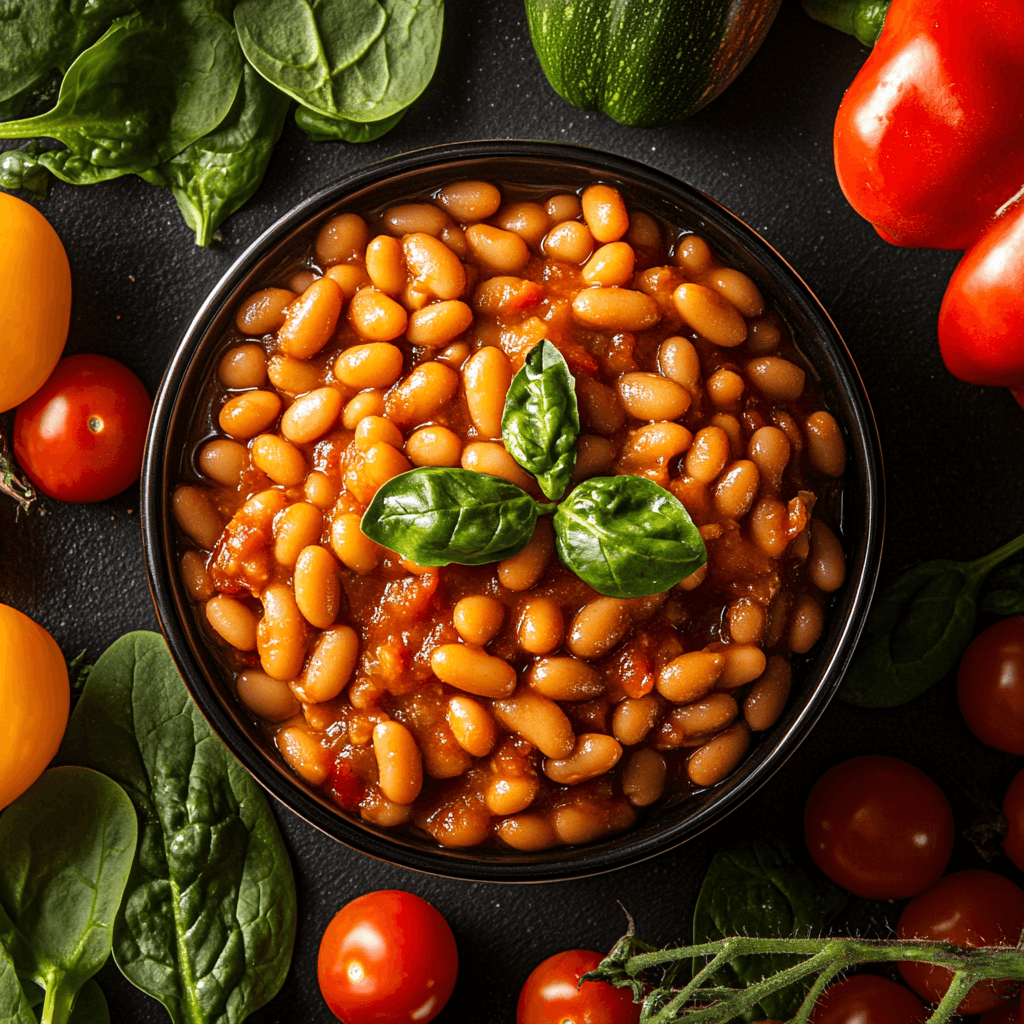Baked beans are a classic American staple that often grace dinner tables, barbecues, and camping trips. one of the most popular brands, are beloved for their savory-sweet flavor and creamy texture. However, with growing awareness about the importance of nutrition and health, many people wonder: “Are Bush’s Baked Beans good for you?”
In this article, we will analyze Bush’s Baked Beans from a nutritional perspective, highlight their health benefits, discuss concerns such as sugar and sodium content, and explore how they fit into different diets. By the end of this article, you will have a clear understanding of whether Bush’s Baked Beans can be a healthy addition to your diet or if they should be eaten in moderation.
Table of Contents
Nutritional Profile

Understanding the nutritional makeup of Bush’s Baked Beans is essential to determine their health value. In this section, we will break down the macronutrients, vitamins, minerals, and less favorable components like added sugar and sodium to paint a complete picture of their nutritional profile.
Calories and Macronutrients
Bush’s Baked Beans come in several varieties, but for standard Original Baked Beans (per 1/2 cup serving, or 130 grams), here is the approximate nutritional breakdown:
- Calories: 150 kcal
- Protein: 6 grams
- Carbohydrates: 30 grams
- Dietary Fiber: 5 grams
- Sugars: 12 grams
- Fat: 0.5 grams
- Sodium: 570 milligrams
Analysis:
- Calories: With only 150 calories per serving, Bush’s Baked Beans are a relatively low-calorie food that can fit into most diets.
- Protein: Each serving provides 6 grams of plant-based protein, making it a solid protein source for vegetarians and vegans.
- Carbohydrates: The beans are naturally rich in carbohydrates, primarily in the form of complex carbs, which provide long-lasting energy.
- Fiber: At 5 grams per serving, they are an excellent source of dietary fiber, which is crucial for digestion.
- Fat: Bush’s Baked Beans are virtually fat-free, which is ideal for those watching their fat intake.
However, the notable downside is the sugar and sodium content, which we’ll discuss further in the next sub-sections.
Key Vitamins and Minerals
Bush’s Baked Beans contain a range of essential vitamins and minerals, including:
- Iron: A key mineral that supports oxygen transport in the body. A serving of Bush’s Baked Beans provides around 8% of the daily recommended intake.
- Calcium: Important for strong bones and teeth, baked beans offer about 6% of the daily intake.
- Potassium: A vital electrolyte for heart and muscle function, Bush’s Baked Beans provide 300 milligrams (approximately 8% of the daily value).
- Magnesium: This mineral supports energy production and healthy nerves, with baked beans contributing to daily magnesium needs.
Added Sugars and Sodium Content
While offer nutritional benefits, their sugar and sodium levels are two factors to monitor closely.
- Added Sugars:
- A half-cup serving contains 12 grams of sugar, equivalent to about 3 teaspoons. While some of this sugar occurs naturally in the beans, a significant portion comes from added ingredients like brown sugar and molasses.
- Excess sugar intake can contribute to weight gain, insulin resistance, and other metabolic issues, particularly if consumed frequently.
- Sodium Content:
- One serving contains 570 milligrams of sodium, accounting for approximately 25% of the recommended daily sodium intake.
- High sodium intake is linked to high blood pressure and increased risk of heart disease.
While Recipe are nutritious, their high sugar and sodium content may be concerning for individuals on low-sodium or low-sugar diets. Moderation and mindful consumption are key.
Health Benefits of Bush’s Baked Beans

Despite concerns about sugar and sodium, Bush’s Baked Beans offer several health benefits due to their plant-based protein, fiber, and overall nutrient density.
A Good Source of Plant-Based Protein
One of the standout features of Bush’s Baked Beans is their protein content.
- 6 grams of protein per serving provides a solid amount of plant-based protein, which is essential for muscle repair, growth, and overall cellular function.
- For vegetarians and vegans, baked beans can serve as an alternative protein source in meals where meat is not included.
Why It Matters: Plant-based protein is generally lower in saturated fat and cholesterol compared to animal proteins, making it a heart-healthy choice.
Rich in Fiber for Digestive Health
Bush’s Baked Beans are a great source of dietary fiber, offering 5 grams per serving, which is about 20% of the recommended daily intake.
- Fiber Benefits:
- Improves digestive health by preventing constipation.
- Supports gut health by feeding beneficial gut bacteria.
- Helps control blood sugar levels by slowing the absorption of carbohydrates.
- Contributes to feelings of fullness, which can assist in weight management.
Interesting Fact: Regular fiber intake is associated with a lower risk of heart disease, type 2 diabetes, and colorectal cancer.
Low Fat and Cholesterol-Free
contain virtually no fat and 0 milligrams of cholesterol, making them a healthy addition to a heart-friendly diet.
- Low-Fat Benefits:
- Reducing dietary fat, particularly saturated and trans fats, can lower bad cholesterol (LDL) and promote cardiovascular health.
- A low-fat diet can support weight management by reducing calorie-dense food intake.
Key Takeaway: offer the dual benefit of being low in fat while still providing essential nutrients and protein.
Concerns About Bush’s Baked Beans

While Bush’s Baked Beans offer a variety of health benefits, it is important to address the concerns surrounding their nutritional profile. The main issues lie in the high sodium content, added sugars, and the presence of certain preservatives or additives. Understanding these factors can help you make informed decisions about including in your diet.
High Sodium Levels
One of the most significant concerns is their sodium content. A standard half-cup serving contains 570 milligrams of sodium, which equates to approximately 25% of the recommended daily sodium limit for an average adult.
Why is High Sodium a Concern?
- Blood Pressure: Excess sodium intake is strongly linked to high blood pressure (hypertension), a major risk factor for heart disease and stroke.
- Water Retention: Consuming too much sodium can cause the body to retain water, leading to bloating and swelling.
- Kidney Health: High sodium levels can strain the kidneys over time, potentially contributing to kidney disease.
Tips for Reducing Sodium
- Opt for reduced-sodium versions offered by the brand.
- Rinse the beans briefly with water before heating to remove some of the excess sodium.
- Pair baked beans with fresh, whole foods like vegetables to dilute the sodium intake in your meal.
Added Sugar Content
like many other commercially prepared baked beans, contain added sugars in addition to natural sugars from the beans themselves. A half-cup serving contains 12 grams of sugar, which includes brown sugar and molasses—two common sweetening agents.
Why is Added Sugar a Concern?
- Weight Gain: Excess sugar intake is linked to weight gain and obesity due to its high-calorie nature and impact on hunger hormones.
- Blood Sugar Spikes: Added sugars can cause rapid blood sugar spikes, leading to energy crashes and increasing the risk of type 2 diabetes.
- Dental Health: Frequent sugar consumption contributes to tooth decay and poor oral health.
Solutions to Reduce Sugar Consumption
- Look for reduced-sugar options from Bush’s, such as their “Less Sugar & Sodium” variety.
- Mix canned baked beans with plain cooked beans to reduce the overall sugar content in your dish.
- Add natural sweeteners like diced tomatoes or a dash of honey at home to control sugar levels.
Preservatives and Additives
To extend shelf life and enhance flavor, canned baked beans often include preservatives and additives. certain varieties may contain:
- Calcium Chloride: Used to maintain the firm texture of the beans. This additive is generally recognized as safe but is still processed.
- Flavor Enhancers: Some Bush’s Baked Beans varieties may include additional spices or flavorings that are not always natural.
Are Additives Harmful?
For most people, the minimal amount of additives in canned baked beans is not harmful. However, those following clean-eating diets or avoiding processed foods might prefer making baked beans from scratch using whole ingredients.
Are Bush’s Baked Beans Suitable for Special Diets?
Let’s evaluate how these beans fit into popular dietary preferences and restrictions.
For Vegetarians and Vegans
Bush’s Baked Beans are a popular choice among vegetarians and vegans because they are made primarily from plant-based ingredients.
- The Original Bush’s Baked Beans contain no meat or animal-based products.
- However, some varieties, such as “Bush’s Baked Beans with Bacon,” do contain animal ingredients.
Takeaway: If you follow a vegetarian or vegan diet, opt for varieties clearly labeled as vegetarian to avoid unintended animal-derived ingredients.
For Low-Sodium Diets
For individuals managing heart conditions, high blood pressure, or kidney problems, sodium intake must be closely monitored.
- Bush’s Baked Beans offer Reduced Sodium options, which contain approximately 25% less sodium compared to the original recipe.
- Rinsing the beans under water can further reduce sodium levels.
Tip: Combine baked beans with low-sodium foods, like steamed vegetables or quinoa, to create a balanced meal without overloading on salt.
For Diabetics and Low-Sugar Diets
The 12 grams of sugar per serving can be a concern for individuals managing diabetes or following low-sugar diets.
- While the beans themselves have a low glycemic index (GI) due to their fiber content, the added sugars can cause blood sugar spikes.
- Diabetics should opt for reduced-sugar varieties or combine baked beans with foods rich in protein and fiber to balance blood sugar levels.
Key Tip: Monitor portion sizes carefully, as consuming too much at once can lead to unwanted blood sugar fluctuations.
Comparing Bush’s Baked Beans to Other Brands
it’s useful to compare their nutritional content, ingredient quality, and overall taste to other popular baked bean brands. This section breaks down how Bush’s stacks up against competitors like Heinz, Campbell’s, and store brands.
Nutritional Differences
While most baked bean brands share similarities, there are key differences in their nutritional profiles:
| Brand | Calories | Protein | Sugar | Sodium | Fiber |
|---|---|---|---|---|---|
| Bush’s Original Baked Beans | 150 kcal | 6g | 12g | 570mg | 5g |
| Heinz Baked Beans | 140 kcal | 7g | 9g | 500mg | 6g |
| Campbell’s Pork & Beans | 130 kcal | 6g | 11g | 480mg | 5g |
| Generic Store Brand | 160 kcal | 5g | 13g | 600mg | 4g |
Key Comparisons:
- Calories: Bush’s Baked Beans are slightly higher in calories compared to Heinz or Campbell’s.
- Sugar: Heinz has the lowest sugar content, while Bush’s and store brands tend to add more for sweetness.
- Sodium: Bush’s and store brands have higher sodium content, while Campbell’s and Heinz offer slightly lower sodium options.
- Fiber: Heinz Baked Beans lead with 6 grams of fiber, but Bush’s comes in close at 5 grams, making both good sources for digestive health.
Takeaway: If reducing sugar or sodium is a priority, Heinz or Campbell’s may be better choices. However, Bush’s remains competitive in taste and overall nutrition.
Flavor and Ingredient Quality
stand out in terms of taste and ingredient quality:
- Flavor Profile: Bush’s beans are known for their rich, smoky-sweet flavor, achieved through the use of brown sugar, molasses, and natural spices.
- Ingredient Transparency: Bush’s emphasizes quality and simplicity with a short list of recognizable ingredients, compared to some generic brands that may include artificial flavorings.
- Texture: Recipe maintain a firm, creamy texture, whereas some competitors may have beans that are overly mushy or undercooked.
Customer Preference:
Many consumers prefer Bush’s for their authentic, homemade taste and consistency. Generic brands, while cheaper, often fall short in flavor and texture.
Tips for Making Bush’s Baked Beans Healthier
While Bush’s Baked Beans are convenient and flavorful, there are ways to make them even healthier at home. By reducing sugar and sodium, adding fresh ingredients, and watching portion sizes, you can maximize their nutritional benefits.
Reducing Sodium and Sugar
- Rinse the Beans: Before heating, rinse canned baked beans under water to reduce both sodium and sugar content. While this may slightly alter the flavor, it significantly improves their health value.
- Dilute with Plain Beans: Mix Bush’s Baked Beans with plain, unsweetened cooked beans (like black beans or kidney beans). This reduces the sugar and sodium per serving while increasing fiber and protein.
- Choose Low-Sodium Varieties: Opt for Bush’s “Less Sugar & Sodium” versions, which contain 25% less sodium and sugar compared to their Original recipe.
Adding Fresh Ingredients for More Nutrition
Enhancing Bush’s Baked Beans with fresh, whole ingredients can improve their flavor and nutrient density:
- Add Vegetables: Incorporate diced tomatoes, bell peppers, onions, spinach, or zucchini to boost vitamins, minerals, and antioxidants.
- Add Protein: For a protein boost, add lean meats like grilled chicken, turkey sausage, or plant-based proteins like tofu.
- Herbs and Spices: Use garlic, smoked paprika, cumin, or chili powder for added flavor without extra sugar or salt.
Healthy Recipe Idea:
- Ingredients: 1 can of Bush’s Baked Beans, 1 cup of spinach, 1/2 cup diced tomatoes, 1/4 cup chopped onions, 1 teaspoon smoked paprika.
- Instructions: Combine all ingredients in a saucepan, heat thoroughly, and serve with whole-grain bread for a balanced meal.
Portion Control and Serving Ideas
While baked beans are nutritious, eating large quantities can lead to excess sugar and sodium intake. Here’s how to practice portion control:
- Stick to Serving Sizes: A half-cup (130 grams) is the recommended serving size. Avoid eating directly from the can to prevent overeating.
- Pair with Balanced Foods: Serve Bush’s Baked Beans alongside:
- Grilled vegetables
- Whole grains like brown rice, quinoa, or whole-wheat toast
- Lean proteins (grilled fish, chicken, or eggs)
- Use Beans as a Side Dish: Rather than making baked beans the centerpiece of your meal, serve them as a nutrient-dense side dish.
Example Balanced Meal:
- Grilled salmon
- Steamed broccoli
- 1/2 cup Bush’s Baked Beans
FAQs
Are Bush’s baked beans good for weight loss?
Bush’s Baked Beans can be part of a weight loss diet when consumed in moderation. Their fiber content helps promote satiety, reducing hunger cravings. However, the added sugar and sodium mean they should be enjoyed in controlled portions.
How much sugar is in Bush’s baked beans?
A half-cup serving of Bush’s Original Baked Beans contains 12 grams of sugar, which includes added sugars like molasses and brown sugar. Opt for the “Reduced Sugar” variety for a healthier alternative.
Are Bush’s baked beans good for protein intake?
Yes, They are a good source of plant-based protein, providing 6 grams per serving. They are ideal for vegetarians and vegans looking to add protein to their meals.
Can I eat Bush’s baked beans every day?
While are nutritious, consuming them daily may lead to excess sugar and sodium intake. Enjoy them in moderation and balance with fresh, whole foods.
Are Bush’s baked beans gluten-free?
Yes, most varieties of Bush’s Baked Beans are gluten-free. However, always check the label to ensure there is no cross-contamination or added gluten-containing ingredients.
Are Bush’s baked beans healthy for kids?
Bush’s Baked Beans can be a healthy addition to a child’s diet due to their fiber, protein, and low fat content. However, limit portion sizes to manage sugar and sodium intake.
Conclusion
Bush’s Baked Beans offer a mix of nutritional benefits and concerns, making them a food that can be both healthy and indulgent, depending on how you incorporate them into your diet. They are a great source of plant-based protein, fiber, and essential vitamins and minerals like iron and potassium. Their low fat and cholesterol-free nature make them a heart-friendly option for most people, particularly those following vegetarian or vegan diets.
However, the high sodium and added sugar content in Bush’s Baked Beans are factors to consider, especially for individuals on low-sodium or low-sugar diets. By choosing reduced-sodium and reduced-sugar varieties, rinsing the beans, and balancing your meal with fresh ingredients, you can enjoy Baked Beans as part of a healthy and nutritious diet.
Overall, Baked Beans are a convenient, tasty, and versatile food. With mindful preparation and portion control, they can be a good addition to your meals, offering both flavor and nourishment.
Print
Are Bush’s Baked Beans Good for You?
Description
Bush’s Baked Beans are a popular store-bought option known for their rich, smoky-sweet flavor. Whether they’re a good choice for you depends on your dietary goals and nutritional needs.
Are They Healthy?
In moderation, Bush’s Baked Beans can be a nutritious side dish due to their fiber and protein content. However, if you’re trying to reduce sugar and sodium intake, consider:
- Choosing lower-sodium or reduced-sugar versions.
- Draining and rinsing the beans to remove some excess sauce.
- Making homemade baked beans to control ingredients.
Instructions
Notes
Health Benefits
✅ Good Source of Protein & Fiber – Beans are naturally high in protein and fiber, which help with digestion, keeping you full longer, and supporting heart health.
✅ Low in Fat – Bush’s Baked Beans are low in fat, making them a heart-friendly option compared to other side dishes.
✅ Contains Essential Nutrients – Beans provide iron, potassium, and magnesium, which are important for overall health.
Potential Downsides
❌ High in Sugar – Many varieties, including the original, contain added sugar (molasses, brown sugar, or corn syrup), which can add extra calories and impact blood sugar levels.
❌ High in Sodium – With around 550mg per serving, the sodium content is significant, which may be a concern for those watching their blood pressure.
❌ Processed Ingredients – Some flavors contain preservatives and additives, which may not align with a whole-food diet.
Nutrition
- Calories: ~150
- Sugar: ~12g
- Sodium: ~550mg
- Fat: ~0.5g
- Carbohydrates: ~30g
- Fiber: ~5g
- Protein: ~6g
